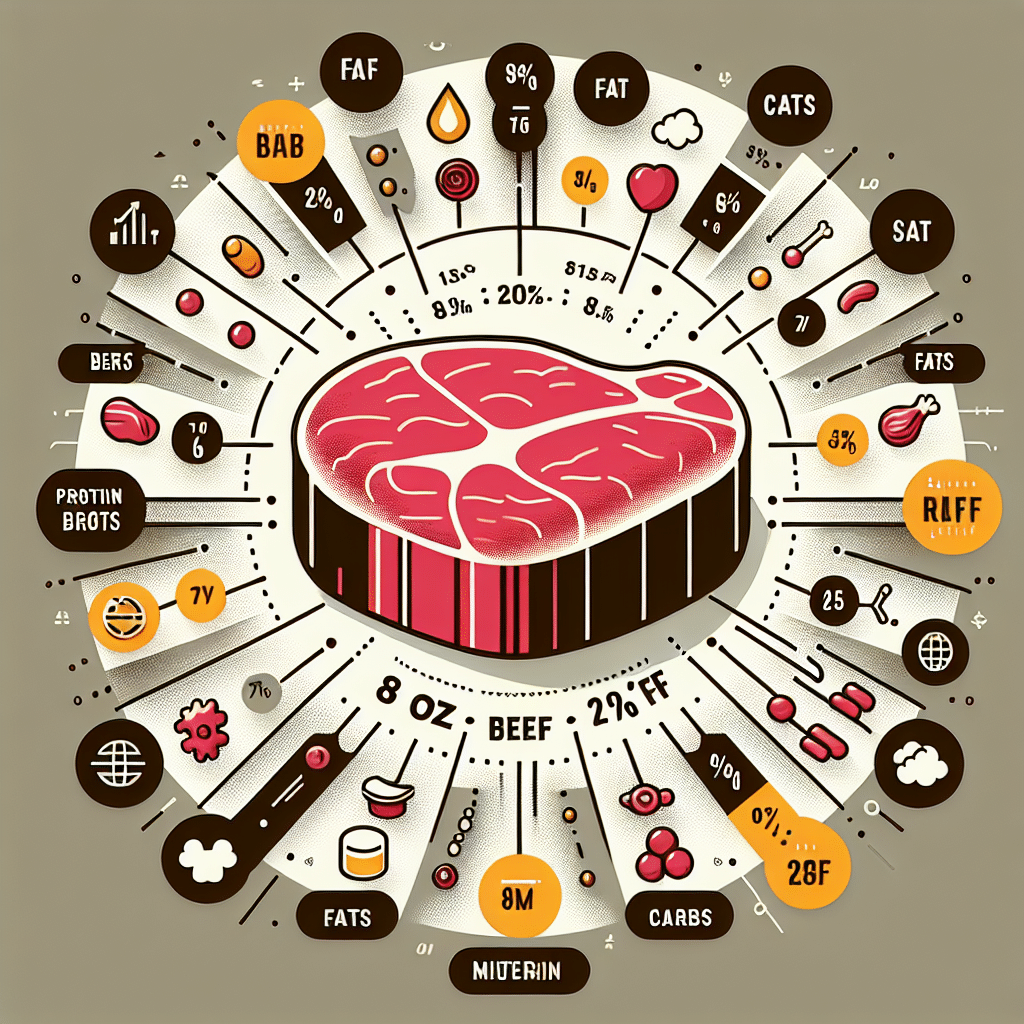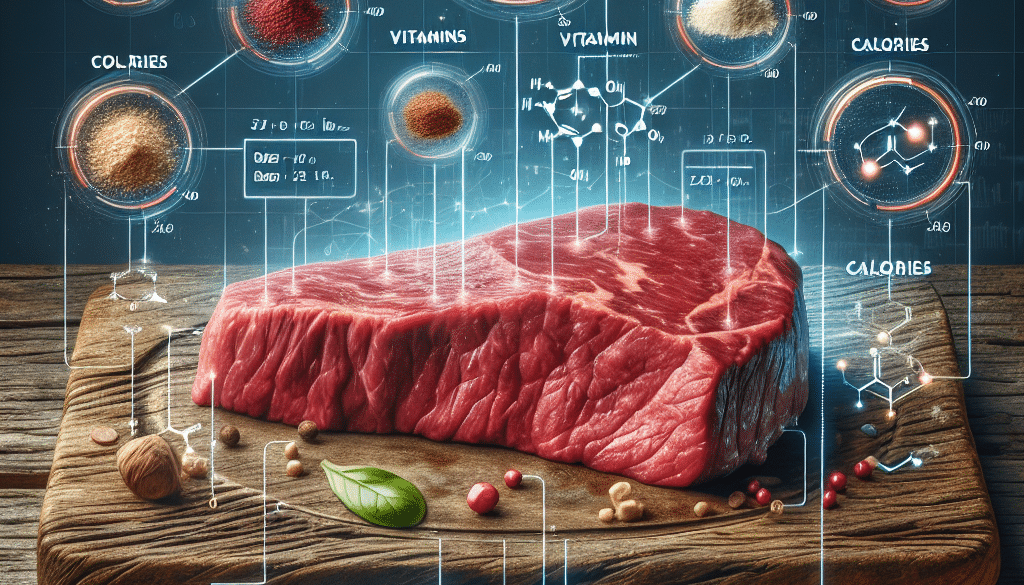8 oz Beef Protein: Meaty Nutritional Breakdown
-
Table of Contents
- Beef Protein Breakdown: A Comprehensive Guide to 8 oz Servings
- Nutritional Profile of 8 oz Beef
- Health Benefits of Beef Protein
- Potential Drawbacks of Beef Consumption
- Comparing Beef to Other Protein Sources
- How to Incorporate Beef Protein into a Healthy Diet
- Conclusion: The Meat of the Matter
- Discover ETprotein’s Plant-Based Protein Alternatives
Beef Protein Breakdown: A Comprehensive Guide to 8 oz Servings

When it comes to protein sources, beef is often a go-to choice for many looking to build muscle, lose weight, or simply maintain a balanced diet. An 8 oz serving of beef is not just a staple in many diets; it’s also packed with essential nutrients that are vital for overall health. In this article, we’ll delve into the meaty nutritional breakdown of an 8 oz portion of beef protein, exploring its benefits, potential drawbacks, and how it compares to other protein sources.
Nutritional Profile of 8 oz Beef
Beef is a rich source of high-quality protein and contains a variety of essential nutrients. Here’s a detailed look at what an 8 oz serving of cooked beef typically offers:
- Protein: Approximately 45-65 grams, depending on the cut and cooking method.
- Fat: The fat content can vary widely, from about 10 grams in lean cuts to 40 grams or more in fattier cuts.
- Calories: A lean cut of beef such as sirloin might contain around 300-400 calories, while a fattier cut like ribeye could have upwards of 600 calories.
- Vitamins and Minerals: Beef is an excellent source of B vitamins, particularly B12, niacin, and riboflavin. It also provides minerals such as zinc, selenium, phosphorus, and iron.
It’s important to note that the nutritional content can vary based on factors like the breed of cattle, their diet, and how the meat is prepared and cooked.
Health Benefits of Beef Protein
Beef protein is not only about building muscle mass; it has several health benefits that make it a valuable addition to a balanced diet:
- Muscle Maintenance: The high-quality protein in beef contains all the essential amino acids needed for muscle repair and growth.
- Energy Production: B vitamins in beef help convert our food into energy, supporting metabolism.
- Immune Function: Zinc and selenium are crucial for maintaining a healthy immune system.
- Oxygen Transport: Iron is a key component of hemoglobin, which transports oxygen in the blood.
Regular consumption of lean beef, as part of a balanced diet, can contribute to overall health and well-being.
Potential Drawbacks of Beef Consumption
While beef can be nutritious, there are potential drawbacks to consider:
- Saturated Fat: Some cuts of beef are high in saturated fat, which can contribute to heart disease if consumed in excess.
- Caloric Density: Fattier cuts of beef are also high in calories, which can contribute to weight gain.
- Environmental Impact: Beef production has a significant environmental footprint, including greenhouse gas emissions and land use.
Choosing leaner cuts and practicing moderation can help mitigate some of these concerns.
Comparing Beef to Other Protein Sources
Beef is just one of many protein sources available. Here’s how it stacks up against others:
- Poultry: Chicken and turkey are generally lower in fat and calories compared to beef but also offer high-quality protein.
- Fish: Fish provides protein along with heart-healthy omega-3 fatty acids, which are not found in beef.
- Plant-Based Proteins: Beans, lentils, and tofu are lower in calories and fat and provide fiber, which is absent in beef.
Each protein source has its unique nutritional profile and benefits, making it important to include a variety in your diet.
How to Incorporate Beef Protein into a Healthy Diet
Here are some tips for including beef in your diet in a healthy way:
- Choose Lean Cuts: Opt for cuts like sirloin, tenderloin, or extra-lean ground beef to reduce fat intake.
- Watch Portion Sizes: Stick to a 3-4 oz serving size to keep calories and saturated fat in check.
- Balance Your Plate: Pair beef with plenty of vegetables, whole grains, and healthy fats for a well-rounded meal.
- Cooking Methods: Grilling, broiling, or baking beef can reduce added fats compared to frying.
By making smart choices, you can enjoy beef as part of a nutritious diet.
Conclusion: The Meat of the Matter
In conclusion, an 8 oz serving of beef protein is a powerhouse of nutrients, offering substantial amounts of high-quality protein, vitamins, and minerals. While it has its benefits, including muscle maintenance and energy production, it’s also important to consider the potential health and environmental impacts of excessive beef consumption. By choosing lean cuts, watching portion sizes, and balancing your diet with a variety of protein sources, you can enjoy the nutritional benefits of beef in a responsible and health-conscious way.
Discover ETprotein’s Plant-Based Protein Alternatives
If you’re looking for a sustainable and health-conscious alternative to beef protein, ETprotein offers a range of high-quality plant-based protein products. Their selection includes organic rice protein, clear pea protein, and various seed proteins, all characterized by a neutral taste and non-GMO, allergen-free attributes. Ideal for those seeking to diversify their protein intake, ETprotein’s offerings cater to a wide array of industries and dietary preferences.
About ETprotein:
ETprotein, a reputable plant protein vegan protein Chinese factory manufacturer and supplier, is renowned for producing, stocking, exporting, and delivering the highest quality organic bulk vegan protein and plant proteins. They include Organic rice protein, clear rice protein, pea protein, clear pea protein, watermelon seed protein, pumpkin seed protein, sunflower seed protein, mung bean protein, peanut protein etc. Their offerings, characterized by a neutral taste, non-GMO, allergen-free attributes, cater to a diverse range of industries. They serve nutraceutical, pharmaceutical, cosmeceutical, veterinary, as well as food and beverage finished product distributors, traders, and manufacturers across Europe, USA, Canada, Australia, Thailand, Japan, Korea, Brazil, and Chile, among others.
ETprotein specialization includes exporting and delivering tailor-made protein powder and finished nutritional supplements. Their extensive product range covers sectors like Food and Beverage, Sports Nutrition, Weight Management, Dietary Supplements, Health and Wellness Products, and Infant Formula, ensuring comprehensive solutions to meet all your protein needs.
As a trusted company by leading global food and beverage brands and Fortune 500 companies, ETprotein reinforces China’s reputation in the global arena. For more information or to sample their products, please contact them and email sales(at)ETprotein.com today.














